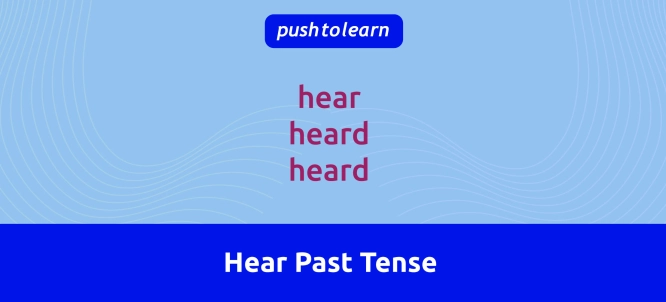by PushtoLearn
Hear Past Tense
Table of Contents
Hear Past Forms - Exercises
These exercises test different forms of the verb HEAR and IRREGULAR VERBS
Meaning
The verb "hear" means to perceive sound through the ears or to listen to and understand something.
Example:
-
"I hear the birds chirping in the morning."
-
"She hears the news on the radio every day."
When referring to past actions, "hear" changes to "heard."

Forms of "Hear"
|
Tense |
Form |
Example Sentence |
|
Present |
hear |
"I hear music playing from the other room." |
|
Past |
heard |
"Yesterday, I heard a beautiful song on the radio." |
|
Past Participle |
heard |
"She has heard this story many times before." |
|
Present Participle |
hearing |
"They are hearing strange noises in the attic." |
Examples of "Hear" in Sentences
Past Tense (heard):
-
"I heard the phone ringing but couldn’t answer in time."
-
"She heard a knock at the door late last night."
-
"They heard the announcement about the delayed train."
Past Participle (heard):
-
"I have heard this song so many times that I know the lyrics by heart."
-
"He had heard about the problem before it was officially announced."
-
"We have heard great things about this new restaurant."
Common Mistakes with "Hear"
1. Using "heared" instead of "heard":
Some learners mistakenly use "heared" as the past tense or past participle of "hear." The correct form is always "heard."
-
Incorrect: "I heared a loud noise outside."
-
Correct: "I heard a loud noise outside."
-
Incorrect: "She has heared the news already."
-
Correct: "She has heard the news already."
2. Confusing "hear" with "listen":
While both "hear" and "listen" involve sound, their meanings are different:
-
Hear refers to the act of perceiving sound. It is often passive. Example: "I heard the alarm but didn’t wake up."
-
Listen implies active attention to the sound. Example: "I listened to the music carefully."
3. Forgetting to use "hearing" for ongoing actions:
Learners sometimes incorrectly use "hear" instead of "hearing" to describe ongoing actions.
-
Incorrect: "I am hear some noise outside."
-
Correct: "I am hearing some noise outside."
4. Overusing "hear" for metaphorical expressions:
"Hear" can be used figuratively (e.g., "I hear you" meaning "I understand you"), but this can lead to overuse or misuse.
-
Incorrect: "I hear him loud and clear, but I don’t agree." (Confusing context)
-
Correct: "I hear you, but I have a different opinion."
Irregular verbs in the Past Simple tense are the focus of this lesson—practice more here. Don’t miss other Grammar Exercises A1 for additional quizzes. Examples of irregular verbs are Ride, Choose, and Rise.
FAQ
What is the past tense of "hear"?
The past tense of "hear" is "heard."
How do I use "heard" in a sentence?
Use "heard" to describe something you perceived through sound in the past.
Example: "I heard the doorbell ring earlier."
What is the past participle of "hear"?
The past participle of "hear" is also "heard."
Example: "She has heard this story before."
Is "heared" ever correct?
No, "heared" is not correct. Always use "heard" for both the past tense and past participle.
Can "hear" be used figuratively?
Yes! Example: "I hear you," meaning "I understand what you are saying."

